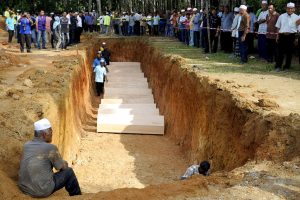Four Thai nationals faced anti-trafficking charges in a Malaysian court today over the 2015 discovery of mass graves containing the bodies of more than 100 people smuggling victims close to the country’s border with Thailand.
In a statement yesterday, Home Affairs Minister Saifuddin Nasution Ismail said that four people wanted in connection with the two countries’ investigation into the graves were extradited from Thailand this week. Local media reported that the men, aged between 30 and 58, arrived in court in Kangar in Perlis state, early on Friday morning, where they were read the charges.
Saifuddin said in his statement that Malaysia was “committed to maintaining border security and viewed issues of cross-border crime seriously, particularly human trafficking and migrant smuggling.”
The four men were among ten Thai nationals that Malaysia had sought for extradition since 2017 as part of its investigation into the discovery of dozens of mass graves close to the Thai border in 2015.
The first of the mass graves – containing more than 30 bodies – was discovered in April of that year, among a number of makeshift camps near the town of Wang Kelian that had been set up by people smugglers. Dozens more were subsequently found, containing scores of corpses belonging to mostly Rohingya refugees from Myanmar. Malaysia eventually confirmed the discovery of 139 grave sites and 28 human-trafficking camps in the northern border region – a rugged region that was once a stronghold of the Malayan Communist Party.
The remote region has long been a major stop-off point for smugglers bringing people from Myanmar and Bangladesh. Most of those fleeing Myanmar were Rohingya, a mostly Muslim ethnic group that has faced decades of persecution in Myanmar, culminating in the Myanmar military’s forced expulsion in August 2017 of more than 700,000 Rohingya civilians into Bangladesh.
Thailand and Malaysia carried out a joint investigation into the camps, and in 2017, Thailand convicted 62 defendants, including an army general and other government officials, in connection with the mass graves. Authorities said that trafficking syndicates held migrants and refugees in the camps as hostages until relatives were able to pay for their release.
In April 2019, Malaysia launched a public inquiry into claims that authorities mishandled their investigation into the mass graves. The inquiry found weaknesses on the part of border patrols but concluded that “no Malaysian enforcement officials, public servants or locals were involved in trafficking or migrant smuggling syndicates,” according to Reuters.
However, an independent report from Malaysia’s human rights commission (SUHAKAM) and the advocacy group Fortify Rights suggested that this might not be the full story. “There is no way death camps on Malaysian soil can happen without local connivance or cooperation by some individuals or some officer of the network,” SUHAKAM Commissioner Jerald Joseph said on the report’s release in March 2019, according to a report by Al Jazeera.
Joseph said that Malaysian police had informed his group that further local investigations required the extradition of seven people from Thailand. It is unclear if this was a reference to the four men charged today, but whether the Malaysian authorities move forward with local investigations bears close watching.

































